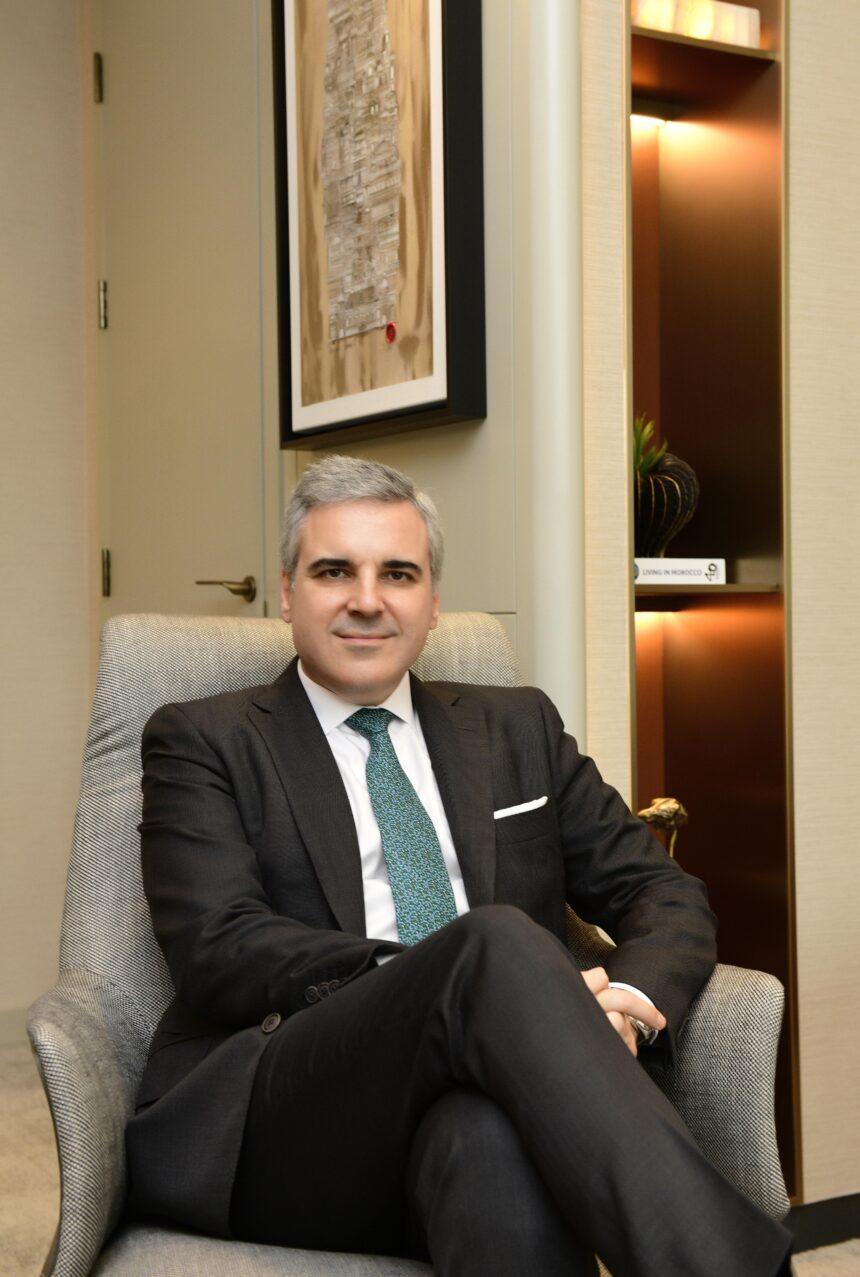BY DIDEM ERYAR UNLU
Operating in the construction and real estate development sectors, Ege Yapi has implemented many projects at home and abroad, such as housing, offices, shopping malls, and educational institutions, since 2006. The company, which has offices in three countries, has completed the construction of an area of 2 million square meters so far, according to Inanc Kabadayi, Chairman of Ege Yapi. “Innovative solutions are inevitable in the real estate industry. The capital should leave the traditional investment models behind and invest in technology and innovative solutions,” Kabadayi said in an exclusive interview with daily EKONOMI.
Ege Yapi has adopted the agile management model. It helps the company’s business models to transform in line with today’s conditions. “Factors such as inflationary pressures, energy efficiency, and sustainability accelerate this transformation. However, we are prepared for all of them with the support of the management model we have adopted,” Kabadayi said. As the company, which has completed 25 projects on an area of 2 million square meters and delivered those projects on time, it has always been able to comply with transformation by prioritizing to stay up to date. “To comply with the future global climate change and produce solutions through advancing technologies have become among our industry’s priorities. We enter 2024 with the vision to turn these challenges into opportunities for us, stakeholders and customers.”
Ege Yapi places particular emphasis on putting sustainability at the heart of its business. The company has served modern urbanization culture in all of its projects, which it has completed since 2006. It continues to operate within the frame of strategic plans from the architectural design of the construction to the solid engineering phase, from cost policies to employment, and from social and cultural space design to all sustainable living spaces. “There is a critical and long process in design and production ranging from choosing plants complying with the climate and requiring water little in the landscape of the project, to rainwater harvesting units, from calculating the glass-towall ratio to integrating photovoltaic panels into projects,” Kabadayi noted.
THE 5̞MINUTE CITY CONCEPT
Ege Yapi aims to raise the earthquake-resistant housing stock by generalizing the cities’ sustainable spaces and contribute to Turkey’s economy and employment. “As it has always been, we’ll prioritize maintaining the Ege Yapi principles, which we have created with an advanced technology-oriented management approach, innovative vision, and strong engineering understanding, by developing them further and reflecting this know-how on all of our projects,” Kabadayi said.
The company launched the 5-minute city concept in 2011. Thanks to this concept, Ege Yapi has demonstrated that environmentally friendly design can be attractive and profitable by including sustainability in its projects with the Class-A Energy Certificate, focusing on low-rise architecture and choosing energy-efficient materials.
Ege Yapi is aware that residences that support a sustainable life with technology based on energy efficiency, social facilities, green spaces, safe structures, and well-designed interiors are vital for modern society. “In the projects we have implemented with this focus, we don’t only reduce carbon footprint with green friendly designs but also create more attractive and sustainable homes,” said Kabadayi. “I particularly emphasize these factors as we aim to be an exemplary brand in the sector. In other words, I express that the brands that don’t focus on sustainability are doomed to disappear,” he added.
INNOVATIVE SOLUTIONS ON THE RISE
Innovative solutions are inevitable in the real estate sector, and the growth on this side proceeds more rapidly, according to Kabadayi. For instance, the off-site production model to reduce carbon emissions and support sustainable life is an outstanding development. Within this frame, Ege Yapi aims to produce around 65-70% of housing at the manufacturing plant and assembly on the site. “The global average hovers around 50-55% in this field. This production model significantly reduces carbon output and enables homes to be produced in a shorter period and be more qualified,” Kabadayi noted. “To minimize it on the production side, we are at the final stage to invest in a startup.” Within this frame, Ege Yapi established its subsidiary Ege Yapi Teknolojik Girisimler AS around a year ago with an innovative perspective. “We have recently made our first startup investment in Missafir. We participated as the strategic investor in this funding round of Missafir, which raised USD 1.1m over a valuation of USD 26m,” Kabadayi noted. As a real estate firm operating to offer a 360degree service, Ege Yapi focuses on startups interested in construction and real estate technologies. So far, the company has invested in three startups. “Apart from Missafir, we’ll announce our investments in two other startups as soon as possible when the necessary procedures are completed,” Kabadayi said.
To him, the accommodation side also experiences rapid developments. “As Ege Yapi, we offer service on the professional rental business line with our The Superior Living brand with the state-of-art technology infrastructure and aim to grow in this sector.”
THE SECTOR HAS PROBLEMS BEYOND DEADLOCK
The real estate sector experiences a problem beyond deadlock as it relies on the banking sector, according to Ege Yapi Chairman Inanc Kabadayi. This situation is valid for those willing to buy a home and those willing to produce. “Land and tax costs account for 50-60% of housing costs minimum in Turkey. We try to finance the construction with the remainder. If the public lands can be used and tax isn’t levied, homes can be produced at prices people can buy,” said Kabadayi. To him, the housing crisis can be overcome by providing interest rate-free loans with specific criteria, as half of Turkey’s surface area belongs to the Treasury. “We especially have difficulty finding land in big cities to produce housing. Urban transformation will be valuable in this sense. There has been a useful regulation in this field. If the problem on the supply side can be solved, some problems can disappear,” Kabadayi noted. The sector experiences a significant deadlock in financing. “While companies like us are borrowed at an interest rate of 3-4% in the developed countries, we can borrow at an interest rate of 40-50% and try to compete with the world,” Kabadayi said, stressing that this factor paves the way for the sector for seeking. For instance, the size of the real estate investment trust (REIT) market jumped 220% to TRY 48.4bn in Q3, year-over-year. The growth of the market is inevitable in the upcoming period. “Moreover, we await the Real Estate Project Finance Fund with the new year. It is expected to pave the way for financing the land development and projects under construction by fundraising,” Kabadayi noted. “Through REITs, you can only invest in real estate with occupancy permits or construction projects under the government’s guarantee, such as the projects of institutions like Emlak Konut and the Housing Development Administration (TOKI). We await a new regulation for this issue in 2024. We particularly demand this regulation because of the price discipline and trust environment.”
POPULATION AND HIKE IN DISASTERS ARE THE TWO MAIN TRENDS
There are two main trends in the changing world, according to Ege Yapi Chairman Inanc Kabadayi. These are the concentration of the increasing population in urban areas and the hike in the number of disasters. These two trends, which are different but interfere, leave the cities at a greater risk day by day. According to data from institutions including the World Bank and the United Nations, 30% of the world’s population lived in urban areas in 1950, and this figure is projected to hit 70% in 2050. “In this outlook, climate change complicates risk estimation by increasing vulnerabilities and makes cities vulnerable. It’s correct to minimize risks for sustainable cities. But approaches based on the current situation and tendencies aren’t sufficient to manage risks under today’s conditions,” Kabadayi said. Urban resilience is the ability of the urban system and its socio-ecological and sociotechnical networks to maintain desired functions against a threat or rapidly return and rapidly transform systems, limiting their adaptation capacity for current or future changing conditions. “From this perspective, the firm steps for urban transformation are vitally critical. Formulas to reduce urban density will be valuable as much as these steps.”










